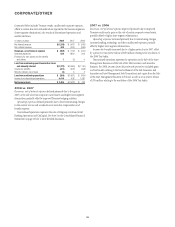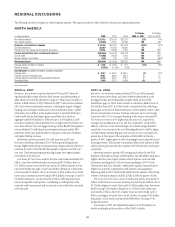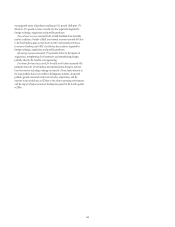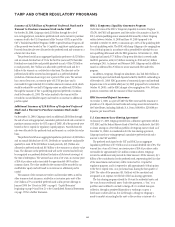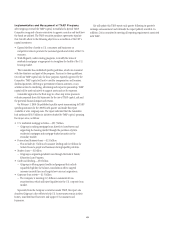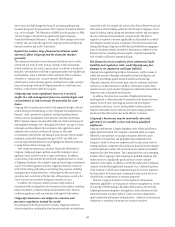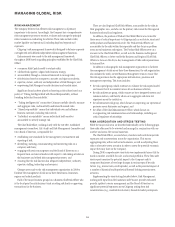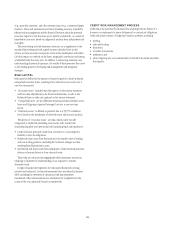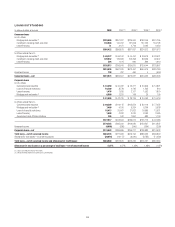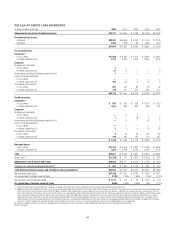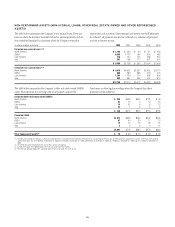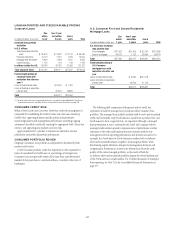Citibank 2008 Annual Report Download - page 53
Download and view the complete annual report
Please find page 53 of the 2008 Citibank annual report below. You can navigate through the pages in the report by either clicking on the pages listed below, or by using the keyword search tool below to find specific information within the annual report.RISK FACTORS
Disruptions in the global financial markets have affected,
and may continue to adversely affect, Citigroup’s business
and results of operations.
Dramatic declines in the housing market during 2008, with falling home
prices and increasing foreclosures and unemployment, have resulted in
significant write-downs of asset values by financial institutions, including
government-sponsored entities and major commercial and investment
banks. These write-downs, initially of mortgage-backed securities but
spreading to credit default swaps and other derivatives, have caused many
financial institutions to seek additional capital and to merge with other
financial institutions. Disruptions in the global financial markets have also
adversely affected the corporate bond markets, debt and equity underwriting
and other elements of the financial markets.
Reflecting concern about the stability of the financial markets generally
and the strength of counterparties, some lenders and institutional investors
have reduced and, in some cases, ceased to provide funding to certain
borrowers, including other financial institutions. The impact on available
credit (even where Citigroup and other TARP participants are making credit
available), increased volatility in the financial markets and reduced business
activity has adversely affected, and may continue to adversely affect,
Citigroup’s businesses, capital, liquidity or other financial condition and
results of operations, access to credit and the trading price of Citigroup
common stock, preferred stock or debt securities.
Market disruptions may increase the risk of customer or
counterparty delinquency or default.
The current market and economic disruptions have affected, and may
continue to affect, consumer confidence levels, consumer spending, personal
bankruptcy rates and home prices, among other factors, which provide a
greater likelihood that more of Citigroup’s customers or counterparties could
use credit cards less frequently or become delinquent in their loans or other
obligations to Citigroup. This, in turn, could result in a higher level of
charge-offs and provision for credit losses, all of which could adversely affect
Citigroup’s earnings. Policies of the Federal Reserve Board or other
governmental institutions can also adversely affect Citigroup’s customers or
counterparties, potentially increasing the risk that they may fail to repay
their loans. Additionally, Citigroup may incur significant credit risk exposure
which may arise, for example, from entering into swap or other derivative
contracts under which counterparties have long-term obligations to make
payments to the Company. Recent market conditions, including decreased
liquidity and pricing transparency along with increased market volatility,
have negatively impacted Citigroup’s credit risk exposure. Although
Citigroup regularly reviews its credit exposures, default risk may arise from
events or circumstances that are difficult to detect or foresee.
Citigroup may experience further write-downs of its
financial instruments and other losses related to volatile
and illiquid market conditions.
Market volatility, illiquid market conditions and disruptions in the credit
markets have made it extremely difficult to value certain of Citigroup’s
assets. Subsequent valuations, in light of factors then prevailing, may result
in significant changes in the values of these assets in future periods. In
addition, at the time of any sales of these assets, the price Citigroup
ultimately realizes will depend on the demand and liquidity in the market at
that time and may be materially lower than their current fair value. Any of
these factors could require Citigroup to take further write-downs in respect of
these assets, which may have an adverse effect on the Company’s results of
operations and financial condition in future periods.
In addition, Citigroup finances and acquires principal positions in a
number of real estate and real estate-related products for its own account, for
investment vehicles managed by affiliates in which it also may have a
significant investment, for separate accounts managed by affiliates and for
major participants in the commercial and residential real estate markets,
and originates loans secured by commercial and residential properties.
Citigroup also securitizes and trades in a wide range of commercial and
residential real estate and real estate-related whole loans, mortgages and
other real estate and commercial assets and products, including residential
and commercial mortgage-backed securities. These businesses have been,
and may continue to be, adversely affected by the downturn in the real estate
sector.
Furthermore, in the past, Citigroup has provided financial support to
certain of its investment products and vehicles in difficult market conditions
and, Citigroup may decide to do so again in the future for contractual
reasons or, at its discretion, for reputational or business reasons, including
through equity investments or cash infusions.
Liquidity is essential to Citigroup’s businesses, and
Citigroup relies on external sources, including
governmental agencies, to finance a significant portion of
its operations.
Adequate liquidity is essential to Citigroup’s businesses. The Company’s
liquidity could be materially adversely affected by factors Citigroup cannot
control, such as the continued general disruption of the financial markets or
negative views about the financial services industry in general. In addition,
Citigroup’s ability to raise funding could be impaired if lenders develop a
negative perception of the Company’s short-term or long-term financial
prospects, or a perception that the Company is experiencing greater liquidity
risk. Recent regulatory measures, such as the FDIC’s temporary guarantee of
the newly issued senior debt as well as deposits in non-interest bearing
deposit transaction accounts, and the commercial paper funding facility of
the Federal Reserve Board, are designed to stabilize the financial markets
and the liquidity position of financial institutions such as Citigroup. While
much of Citigroup’s recent long-term unsecured funding has been issued
pursuant to these government-sponsored funding programs implemented, it
is unclear whether, or for how long, these facilities will be extended and what
impact termination of any of these facilities could have on Citigroup’s ability
to access funding in the future. It is also unclear when Citigroup will be able
to regain access to the public long-term unsecured debt markets on
historically customary terms.
Further, Citigroup’s cost of obtaining long-term unsecured funding is
directly related to its credit spreads in both the cash bond and derivatives
markets. Increases in Citigroup’s credit qualifying spreads can significantly
increase the cost of this funding. Credit spreads are influenced by market
perceptions of Citigroup’s creditworthiness and may be influenced by
movements in the costs to purchasers of credit default swaps referenced to
Citigroup’s long-term debt.
Citigroup’s credit ratings are also important to its liquidity. A reduction in
Citigroup’s credit ratings could adversely affect its liquidity, widen its credit
spreads or otherwise increase its borrowing costs, limit its access to the
47



